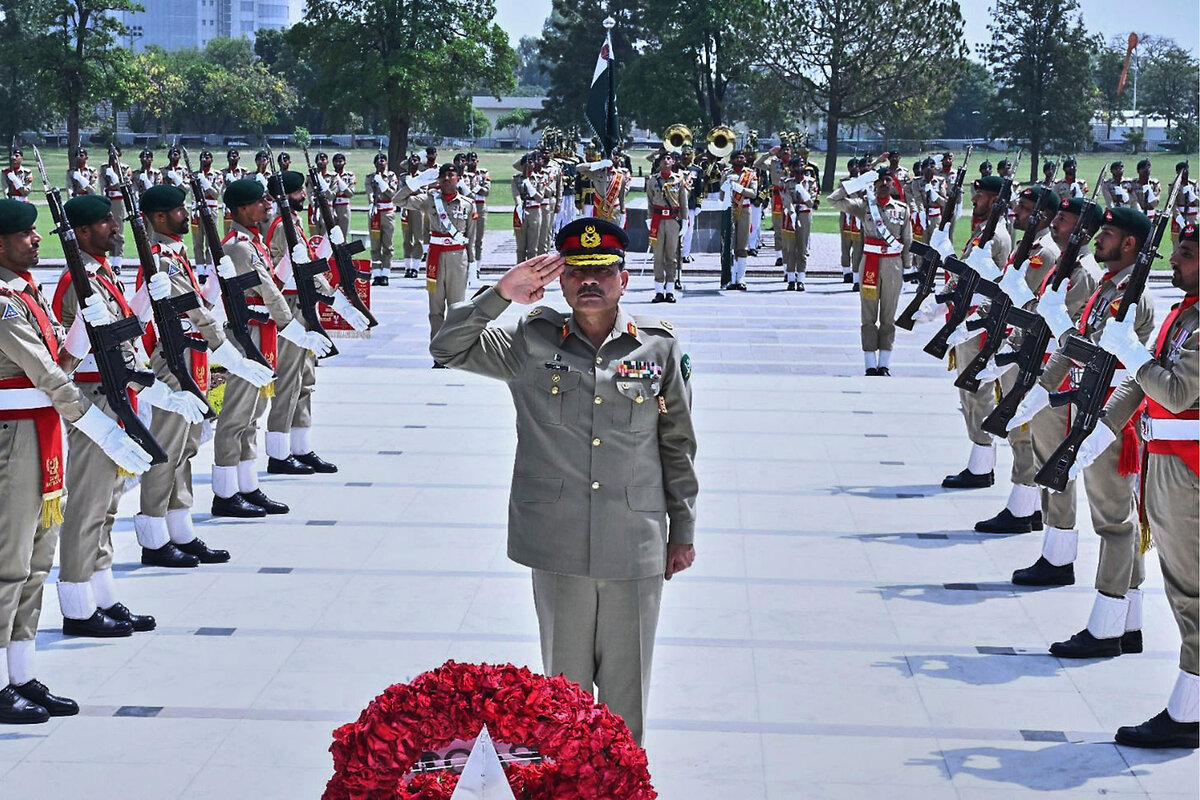What Pakistan’s military gained from the conflict with India: Popularity
Loading...
| Rawalpindi, Pakistan
Nine months ago, Pakistan sent troops onto the streets of the capital, Islamabad. Civilian protesters, outraged by the military’s continuous meddling in politics, were pelting police with stones, and calling for “revolution.” Security officials had “shoot to kill” orders.
Now, those same streets are calm, their walls plastered with posters singing the army’s praises.
This shift from condemnation to celebration dates from last month's brief but intense confrontation with India, when the Pakistani military claimed to have shot down five Indian fighter jets. The military’s surprise triumph sparked a wave of nationalist fervor that has united Pakistanis from all walks of life.
Why We Wrote This
The India-Pakistan conflict has inspired a wave of nationalist unity in Pakistan and rallied support for the country’s powerful military. What does this shift mean for efforts to contain the army's influence?
It is hard to predict how long this sense of unity will last, or to what extent it will derail long-term efforts by civilian politicians to curb the army’s influence in Pakistani politics. It’s not even clear exactly how many jets Pakistan shot down: Islamabad and Delhi have offered competing accounts of the conflict, which ended in a ceasefire on May 10th, and both have tasked international delegations with trying to wrest control of the narrative.
What is evident is that the Pakistan army has emerged a victor at home, well placed to consolidate its already immense domestic power. Defense spending went up by more than 20% in last week's budget, even while overall spending was cut by 7%. Meanwhile, army chief Syed Asim Munir has become only the second officer in Pakistan’s history to attain the five-star rank of Field Marshal. He is currently on an official visit to the United States – another sign of his rising influence.
When conflict first erupted between the nuclear-armed neighbors, “Indian commentators were arguing … that it was a really excellent time to attack because the Pakistan army was so unpopular,” says Gul Bukhari, a Pakistani political commentator. “But when a husband and wife are at one another’s throats and they get attacked from outside, they will come together.”
And come together they have.
A vicious loop
A poster of Field Marshal Munir hangs on a towering pylon beside a public park in Rawalpindi. “We’re ready,” it says. “Don’t test our resolve.”
Though the message is ostensibly aimed at India, which Pakistan claims it “defeated” in the four-day conflict, it resonates too with Tehreek-e-Insaaf, the political party led by jailed former premier Imran Khan.
Mr. Khan – who remains Pakistan’s most popular leader, and blames the army for his ouster in April 2022 – stands accused of masterminding a series of riots in May 2023, in which his supporters reportedly attacked military installations across Pakistan. He also accuses the army of rigging the 2024 general election to install a puppet administration – a claim supported by international media, and made credible by the army’s track record of political meddling.
In the nearly eight decades since Pakistan came into existence, it has experienced 33 years of direct military rule. The rest of the time, the army has wielded influence from the shadows, acting as a power-broker in the country’s fragile democracy.
By targeting Mr. Khan and thousands of his supporters, the military sparked an unprecedented public backlash and demands for systemic reform.
But “in both India and Pakistan, in times of war, the jingoistic urge takes over,” says Shuja Nawaz, a Distinguished Fellow of the South Asia Center at the Atlantic Council, a think tank in Washington D.C. “The media becomes captive to whatever message they’re getting from the authorities, and they magnify it and feed it back into a kind of vicious loop.”
Still, the systematic issues remain.
The army’s role in Pakistan
The army’s overwhelming influence in domestic affairs has its roots in the colonial period, when Punjabi Muslims, considered a “martial race” by the British rulers of India, formed the backbone of the British Indian army. When Pakistan became an independent country in 1947, the army emerged as the new nation’s strongest institution, prevailing over civilian leaders, many of whom had migrated from India.
Over time, the military’s influence over both the judicial and executive branches of government has become an open secret in Pakistan. It also controls much of the country’s wealth.
“The military … has crowded out the private sector,” says Mr. Nawaz. “It has taken over the national highways, it has taken over transportation. Those are very visible signs of the military’s footprint.”
If the military is enjoying a boost in its popularity now, argues local political analyst Hamid Mir, it is because the army was performing its constitutional function during the clash with India, instead of meddling in areas beyond its ambit.
“When they were doing their real job, the people appreciated them,” he says. “This is a golden opportunity for them. They should stop interfering in politics.”
Many analysts would call that wishful thinking.
For one, Pakistan’s biggest champion of unfettered civilian rule is expected to remain in jail for the foreseeable future.
Mr. Khan is “certainly a little less relevant to the way things are shaping up” post-conflict, says veteran journalist and former government spokesperson Fahd Husain. “His main opponent [the military establishment] is much more popular, much more powerful. That shrinks the options that he has.”







